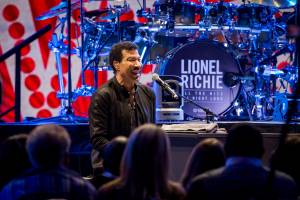Lionel Richie returns to his All the Hits residency at the Axis at Planet Hollywood tonight, November 29, and continues with six shows in December. Las Vegas Weekly caught up with the music legend as soon as he touched down on the Strip this week to discuss what sets his Vegas show apart—the songs.
The other headliners at the Axis have built these big, spectacular productions around a smaller amount of material. Your show is different because you have all the material. My biggest problem is it’s guaranteed someone is gonna leave saying, “I can’t believe they didn’t play …” You know, there’s the Greatest Hits tour, then there’s the All the Songs I Ever Played in My Life tour (laughs), We are really blessed. There was a point in my life when all we had to do was worry if we had enough music to play one hour of our songs only. If you’ve got that, you’ve got yourself an opportunity to have a career. Then you go into two hours, or two and a half, and you’ve got a problem. They give you a time slot so you have to cut it down, and what do you want to leave out? I’m in that blessed category because I don’t need the dancers and all the stuff in between, I just need the next song.
But having so many hits must make it difficult to build your show and make those choices. Absolutely. It’s always a problem. When we’re in England, we have three more albums that they’ve never heard in America. And people from England are coming here, and people from China and Germany. Every night we try to make the perfect set. I like Vegas because that’s a great problem to have here. Even if we’re trying to experiment, it still comes out to a great show. You know you’re doing “Easy” and “Brick House” and “Hello” and “Truly” and “Dancing on the Ceiling,” because it’s like Springsteen and “Born in the U.S.A.”—you can’t walk off without doing those songs. But then you get to fill in the blanks. I also like it here because I get to hear what they’re saying. When you plan an arena, all you hear is [the roar of a crowd] then it’s the next song, then [the roar]. Here, I put the mic down and they’re singing every word with me, and that’s so important to me.
I was an ’80s kid, and the three records I remember playing back then until they were worn out were Thriller, Purple Rain and Can’t Slow Down. Yep. Oh yeah.
I didn’t realize at the time, but Can’t Slow Down seemed to have so many different kinds of songs, yet there were only eight tracks on that album. Isn’t that crazy? When I turned the album in, the record company said, “Are you kidding me?” Here’s the joke: Seven of the eight were hits. The whole album was a greatest hits package.
But the concept back then—which I love, to go a little old school—was that there was a record store. You want to come out with your album at the same time as Michael and Prince and Springsteen and Madonna. Why? Because when you walk to the front of the store, there was always the latest releases, so you go to pick up Thriller and there’s Can’t Slow Down. You’re not going to walk out with just one. So I wanted to make sure I was with that group because as much as we were competition, we were friends with a healthy respect for each other. We all had our lane, but it was all called pop and R&B music, and each of those records had their own identity.
You’ve always played with your musical identity. From that record, you had “Stuck on You,” which was really a country song. Were you trying to dabble in different genres or just doing what came naturally? I was doing what I was doing. I was not at Sony, or Columbia, or Atlantic Records. I was at Motown. It’s a black company. So we didn’t have an R&B department; we just had the records. I didn’t know to break with R&B and cross over, I just knew to put the record out.
I had [former Motown president] Skip Miller, a dear friend and the gentleman I give all the credit to for giving me that permission, who saw me wrestling with this thing and said, “Don’t try to figure out all that; just write what you want to write and I’ll get it to the right people.” So when I wrote “Sail On,” I wasn’t thinking about all that. I was going after Billy Joel and Elton John and James Taylor. I didn’t get that we had categories. The brilliance of Motown was they never pigeonholed us. I didn’t really get scared until probably “Three Times a Lady,” when I realized I dropped a waltz in the middle of disco and funk (llaughs). That’s when I realized I might want to dial it back a little bit.
Are there any new artists out there you see doing that today, pushing through those different genres? A great song is a great song—let’s start there. What has always crippled the artist is record companies and radio and now the streaming world having these things called categories. It’s like saying to an actor you can only play this character for the rest of your career. If you start a funkster, you’re always gonna be a funkster. So I guess I defied the laws of gravity.
Today, I would say Bruno Mars has that left and right thing going on. He gets it. Chris Stapleton—forget about it. He’s a writer, man. But on top of that he gets onstage and he’s just a badass.
That’s what it’s about. You don’t go to see Dylan with dancers; he’s gonna tell you a story. You’re looking for the character and the flavor. Everything doesn’t have to be boom-bam-boom. Why are you crying in the middle of that song? Because that’s a badass song. Melody is king. I’m a writer first and a performer second.
Lionel Richie November 29 & December 6, 8, 9, 13 & 15, 8 p.m., $44-$300. The Axis, 702-777-2782.








